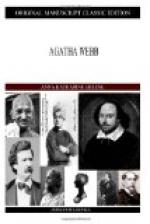“’Who are you? I cried. ‘You are not Blind Willy, I’m sure.’
“But his only answer was ‘Bread!’ while he leaned so hard against the counter I felt it shake.
“I could not stand that cry of ‘Bread!’ so I groped about in the dark, and found him a stale loaf, which I put into his arms, with a short, ‘There! Now tell me what your name is.’
“But at this he seemed to shrink into himself; and muttering something that might pass for thanks, he stumbled towards the door and rushed hastily out. Running after him, I listened eagerly to his steps. They went up the hill.”
“And the money? What about the money?” asked the coroner. “Didn’t he come back for the change?”
“No. I put it in the till, thinking it was a dollar bill. But when I came to look at it in the morning, it was a twenty; yes, sirs, a twenty!”
This was startling. The coroner and the constable looked at each other before looking again at him.
“And where is that bill now?” asked the former. “Have you brought it with you?”
“I have, sir. It’s been in and out of the till twenty times to-day. I haven’t known what to do with it. I don’t like to think wrong of anybody, but when I heard that Mrs. Webb (God bless her!) was murdered last night for money, I couldn’t rest for the weight of this thing on my conscience. Here’s the bill, sir. I wish I had let the old man rap on my door till morning before I had taken it from him.”
They did not share this feeling. A distinct and valuable clew seemed to be afforded them by the fresh, crisp bill they saw in his hand. Silently Dr. Talbot took it, while Mr. Fenton, with a shrewd look, asked:
“What reasons have you for calling this mysterious customer old? I thought it was so dark you could not see him.”
The man, who looked relieved since he had rid himself of the bill, eyed the constable in some perplexity.
“I didn’t see a feature of his face,” said he, “and yet I’m sure he was old. I never thought of him as being anything else.”
“Well, we will see. And is that all you have to tell us?”
His nod was expressive, and they let him go.
An hour or so later Detective Knapp made his reappearance.
“Well,” asked the coroner, as he came quietly in and closed the door behind him, “what’s your opinion?”
“Simple case, sir. Murdered for money. Find the man with a flowing beard.”
XI
THE MAN WITH A BEARD
There were but few men in town who wore long beards. A list was made of these and handed to the coroner, who regarded it with a grim smile.
“Not a man whose name is here would be guilty of a misdemeanour, let alone a crime. You must look outside of our village population for the murderer of Agatha Webb.”
“Very likely, but tell me something first about these persons,” urged Knapp. “Who is Edward Hope?”




